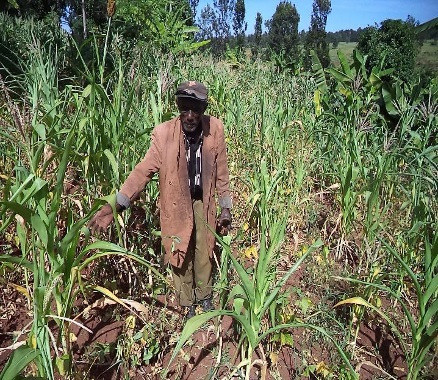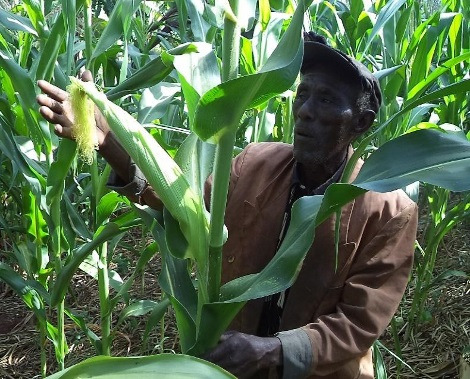Today’s blog post is from 71-year-old Tarciscius Irungu, who has four sons and three daughters and also takes care of his three grandchildren and two orphans.
He lives with his aging wife and works as a farmer. He does all his own farm work together with his family, raising crops on his two acres of land, rearing chickens, and tending to his local breed cow. Mr. Irungu lives in South Muranga County in central Kenya, where World Renew through its partner ADS Mt. Kenya (ADS-MK) has been implementing a Canadian Foodgrains Bank-funded food security program for the past three years.
Dear friends,
I had no idea that farming would become my career; it is all that I knew growing up. I never knew there was need to farm with a particular goal in mind—to me it was just common to go to the farm in the morning, work until noon, and attend to other duties. It is a routine that I have cultivated in my children. My knowledge was that I am supposed to grow maize and beans alongside other crops like bananas and mangoes. I never thought of growing drought tolerant crops that are high in nutrition that do better in this climatic zone. I never imagined they would give me a good harvest. I have learned how to grow crops using the Farming God’s Way (FGW) methodology, and despite the low rainfall levels I am able to harvest more than I would have otherwise. I have learned that growing crops does not need to be at the onset of rains, since I can use very little water and grow vegetables. I have also learned that chemical fertilizers do not need to be my immediate concern, since I can make more sustainable compost and other organic crop sprays for controlling pests on my farm.
This program has significantly improved my health, and I feel more energetic.
After I received my training, I am now able to take better care of my chickens. I built them a house, improved the way I feed them, and learned how to keep them free of diseases and pests as well as predators. I also participate in dry-season farming and no longer buy vegetables from the market at any time throughout the year.
This is my third year practicing technologies I have received from ADS-MK. Most important has been dry-season farming using drip irrigation; during the dry months I have been able to grow kale for my household consumption. I constantly collect eggs from my improved indigenous chickens, and my family’s nutrition has greatly improved. I am able to save money since I no longer buy chemical fertilizers, vegetables, or meat. The total labor and time I use on my field has been drastically reduced since I no longer plough or weed. This has significantly improved my health, and I feel more energetic.

I feel like I will live longer, and my wife and I are more united since I am providing enough for her. I received a pair of chickens that have been giving us eggs for our domestic consumption, and I have also been breeding more chickens. The certified dolichos, pigeon peas, and cassava seeds that I received from the project have helped to ensure that my farm has something all year through, since they are able to withstand the long dry spell. I would like to see youths involved in farming activities rather than engaging in alcohol and drug abuse. Also, if all community members would be more involved in water harvesting, it would improve the general environment and better our farming practices.
The difference between Conservation Agriculture (above, right) and conventional plots (above, left) has been very noticeable. I planted both plots at the same time using the same seed variety.
Blessings,
Mr. Tarciscius Irungu

